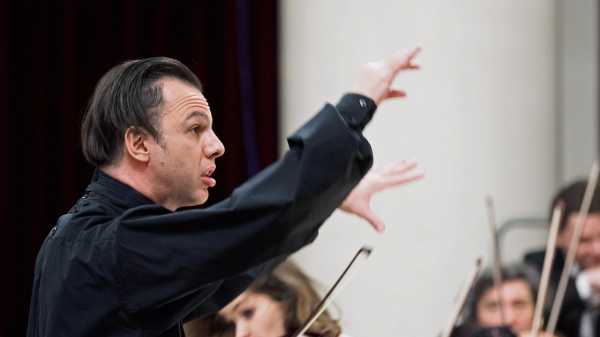
Since the early nineteenth century, when conductors began leading symphony orchestras in concert, they have been the subject of fascination, myth-making, and no small degree of cliché. The conductor is an oracle and interpreter, a guide and disciplinarian—and, for me, a novice aficionado of classical music, a necessary hand in the dark and a useful focal point. The conductor’s high status was codified in “Crowds and Power,” the Nobel Prize–winning author Elias Canetti’s book from 1960, which declares, “There is no more obvious expression of power than the performance of a conductor.” Canetti writes of how the conductor’s “attention is everywhere at once. . . . inside the mind of every player.”
I thought of Canetti as I made my way, one recent evening, to the grand hall of the St. Petersburg Philharmonic, a soaring, colonnaded space built in 1839 for the city’s nobility. It’s a confection of tsarist excess, replete with heavy velvet curtains and droopy chandeliers. Yet the hall has been the site of far more than mere celebration and delight: in 1942, with the city—then known as Leningrad—under siege by the Nazi army, which ultimately led to a million and a half people dying of starvation, it hosted perhaps the most extraordinary musical première in modern history, when, in the middle of a three-year blockade, a troupe of local musicians put on Shostakovich’s Seventh Symphony.
I had come to hear another St. Petersburg première, though nothing as resonant as that Shostakovich symphony, but a meditation on life and loss all the same. Teodor Currentzis and musicAeterna, the orchestra that he has led for the past fifteen years, were performing Giuseppe Verdi’s Requiem, the composer’s shattering and operatic funeral mass from 1874. They toured Europe with the piece this spring, selling out concert halls and receiving ecstatic reviews: “a thrilling thing to witness, both visually and aurally,” went one, after a performance in April in Aix-en-Provence; “less concert, more ritual,” declared another, from the Lucerne Easter Festival, the same month. Currentzis is from Greece but has spent his career making music in the Russian hinterlands. More recently, he has gone from a whispered-about, quasi-underground legend to one of the world’s most in-demand conductors. On Wednesday, Currentzis and his orchestra will make their North American début: they will perform Requiem for three nights at the Shed, the performing-arts venue at Hudson Yards.
I arrived a couple hours early to the St. Petersburg philharmonic, and Currentzis was leading his musicians through a last rehearsal. Currentzis is forty-seven and imposingly tall, and has striking features and a reliable wardrobe of tight black jeans and black leather boots with red laces. His look has given rise to a mythology of its own—a 2016 documentary on him was titled “The Classical Rebel”—but that misses something that is, if not quite traditional, then at least reverential and disciplined about him. In a profile in the Times earlier this fall, Michael Cooper wrote, “He has been described as a punk, a goth, an anarchist and a guru—all of which have elements of truth, but fail to convey the blend of talent, charisma and energy that has swept him from the periphery of the music world to its most prestigious stages.”
When I spoke with Currentzis, he rejected the idea that there is anything provocative or theatrical about his conducting. “What’s the alternative?” he asked. “That you come onstage to play Verdi’s Requiem and make a face that you don’t really care, just play it cool and count out the notes?” That strikes him as both a waste of time and unfaithful to Verdi’s intent. “People say ‘theatrical’ to mean fake, but it’s not fake to be honest about your own ideas and beliefs, to dive into all the dimensions of music, to melt inside it and fall in love with it.” (“Of course,” Currentzis said with dismay, “for the contemporary ironic person, love doesn’t exist, it’s just some hormones, a bit of the right brain mixed with the left.”)
Currentzis was raised in Athens and, in 1994, at the age of twenty-two, came to St. Petersburg to study conducting at the city’s music conservatory. His teacher was Ilya Musin, a famed pedagogue who trained Valery Gergiev, director of the Mariinsky Theatre, and Semyon Bychkov, who left Russia for a stellar conducting career in the West. The Soviet Union had collapsed just a few years before Currentzis arrived, and there was a heavy melancholy in the air. He fell in with a group of artists and musicians who gathered to debate the great questions of life in cramped dorm rooms and communal apartments. “Life was difficult, but also very true, and very emotional,” he told me. Currentzis was struck by what he called the Russian people’s “romantic attitude in brutal times.”
After finishing his studies, Currentzis was invited to Novosibirsk, a city in Siberia with a strong classical tradition. He founded musicAeterna in 2004, with musicians from across Russia. In Perm, he expanded the orchestra, gathering musicians from Germany, Japan, and Poland. Their performances of Baroque composers like Handel and Purcell—a noticeable swerve from the standard middlebrow symphony fare of Beethoven and Tchaikovsky—came “not so much as a surprise but a real shock,” said Afanasy Chupin, who began playing with Currentzis as a fifteen-year-old music student in Novosibirsk and is now musicAeterna’s first-chair violinist.
Seven years later, Currentzis was named artistic director of the opera house in Perm, an industrial city of just under a million people in the Ural Mountains. He moved the hundred-plus musicians of musicAeterna with him. This new city allowed for a single-minded dedication to music, with musicAeterna coming to resemble a faith community of musical obsessives as much as a traditional orchestra. “Perm is such a calm city, with not so many people and not a whole lot going on,” Chupin told me. “It was there where I learned how to first do what’s genuinely important, and, only after that, everything else.” Currentzis acknowledged the power of the structure he built: “People change, or they leave,” he said, before adding, “Though this scares me a little, because I don’t want to create a sect.”
At the time, Perm was in the middle of what became known as the city’s “cultural revolution,” a period of heightened state interest in contemporary art and avant-garde culture. Public sculpture popped up around town, a new art museum opened, and, at the opera house, Currentzis was beginning to attract wider critical attention. A reviewer in the Guardian called his recordings of three Mozart operas “so grand, so life-affirming and life-changing, so far beyond anything that has come before it that it has, for me, redefined music itself.”
Currentzis turned the annual Diaghilev Festival, in Perm, into a multi-platform happening, with dance performances, public talks, and late-night parties. He gained a reputation as headstrong, but with an undeniable vision. For the première of “Cantos,” a piece of choral music by Alexey Syumak, a contemporary Russian composer, inspired by the life and works of Ezra Pound, Currentzis convinced the municipal authorities to shut off the lights in the area surrounding the opera house so that, when concertgoers left the performance, they stepped out into a hauntingly darkened cityscape, with several bonfires lighting the night sky.
Rehearsal sessions for musicAeterna became the stuff of legend. In Perm, they could stretch on long past midnight. Chupin told me of playing eight bars from “Marriage of Figaro” for over four hours, over and over, until Currentzis heard the sound he wanted. At the end of the Mozart cycle, Currentzis wasn’t happy with the recording of “Don Giovanni,” so he pushed Sony Music to finance doing the whole thing all over again. Markus Hinterhäuser, the artistic director of the Salzburg Festival, told me that Currentzis and musicAeterna showed up more than a month before they were set to perform Mozart’s “La Clemenza di Tito” in 2017. They rehearsed every day for six weeks; this struck Hinterhäuser as a rare, almost unbelievable amount of practice time for ensembles on the international festival circuit. “They went over every bar, every note, every single detail,” he said. (My colleague Alex Ross wrote favorably of the “La Clemenza di Tito” performance in Salzburg, calling Currentzis a “restless, interventionist conductor” with “fanatic intensity.”)
Currentzis and musicAeterna have appeared every year since at the Salzburg Festival, and Hinterhäuser has come to know Currentzis as an exacting and particular musician. “He can be demanding, and it’s not always easy with him,” Hinterhäuser said. “But he’s never creating difficulties just for the sake of it, or out of ego, but because he wants to achieve something. As Hinterhäuser put it, “He is not satisfied with the average. The language of music offers millions of dynamic possibilities, and he wants to explore them all, to make his way through this geography of detail and emotion.”
When we spoke, Currentzis compared his approach to meditation: “You don’t start by reading the whole book, but take just one word, and read it over and over. You pronounce it with different colors and meanings, and try and figure out what this word means to you.” During a break in rehearsal before the St. Petersburg performance, I caught up with Laura Pou, a flutist from Barcelona. Eight years ago, she was finishing up a program for young musicians at the London Philharmonic Orchestra when she travelled to Perm to play Shostakovich’s Fifth Symphony and Tchaikovsky’s Violin Concerto, with Currentzis conducting. She was immediately hooked, and decided to move to Perm.
“This is another way of doing music,” she told me. “You organize your life around it. And it can be intense, maybe not for everybody.” She told me of their preparations for Requiem: they spent a month rehearsing the piece, then toured around Europe playing it for several more weeks; now they had several days of further rehearsal in St. Petersburg, and would arrive in New York a week ahead of time for rehearsals at the Shed. “Do you think we really need all this practice to put on a good concert?” she asked. “Of course not.” But, she went on, “In order to find the same note of concentration and meaning, this takes time, just like with any relationship.”
Vitaliy Polonsky, the choral director for musicAeterna, who has been working with Currentzis for more than a decade, said that the process of repetition allows him to understand what he wants to say through music. “Such careful study affords you the freedom to make a statement,” he told me. “If you break down the score, know its layers, and really live through this experience, you earn the right to speak.” I recalled a performance of Mahler’s Fourth Symphony by Currentzis and musicAeterna that I saw in Berlin last year, which felt like going on an hour-long journey that was at once technically precise and emotionally convulsive.
For Requiem, Currentzis has the orchestra and eighty-person choir put on black robes, which amplifies the sombre, funereal air. In St. Petersburg, the first notes emerged so softly, they felt as if they were wafting in from behind the walls. When the bass drum knocked with terrifying force to announce the appearance of the Dies Irae, Requiem’s most recognizable passage, I got a chill of transcendental fright, as if death itself had come for us in the philharmonic hall, his arrival announced with a guttural whoosh. Currentzis decided to have the musicians play the concert standing up, buckling and swaying with the music, delivering an added measure of urgency to a piece of music already thick with existential drama.
Currentzis is an emotive and physically expressive conductor: urging, inviting, cajoling, and thrusting along with his musicians, imparting a presence that feels both corporal and psychological. There is an element of theatre in his movements—or exaggerated playacting, some of his doubters would say—but I found his presence captivating, an invitation to enter whatever trance had clearly taken hold over him. As Requiem neared its climactic finish, with the fearsome Dies Irae returning, the orchestra played with intensity and precision, driving a wall of sound that I thought might lift off the roof of the grand hall. The piece ended with a silence that Currentzis had the musicians hold for what seemed like minutes; I felt both invigorated and totally spent. Finally, Currentzis signalled for the orchestra to come out of their freeze, and the crowd erupted in a standing ovation.
Afterward, I made my way to a small antechamber in the back of the philharmonic, where Currentzis was holding court for fans and well-wishers, or anyone who felt the need to unburden himself of his emotional response to Requiem. A few years ago, I saw Currentzis and musicAeterna play in Perm, and, after the concert, stopped by his office on the bel étage of the opera hall, which resembled a eighteenth-century French boudoir, with a couch upholstered in deep-red velvet and the heady spice of perfume in the air. A stream of people wanted to talk to the maestro about love, beauty, art—interactions that could have come off as cloying or pretentious if they weren’t so sincere, and Currentzis not so invested and happy to engage. In St. Petersburg, it was the same: concertgoers asked him about his understanding of the eternal and what Verdi has to tell us about celebrating life while mourning its loss.
The scene was in keeping with Currentzis’s romantic and polymathic interests; one gets the sense that music is where his training and habits lie, but he’s no less interested in film, poetry, or even experimental psychics. He enjoys the unironic emotionality of performing for Russian audiences. “People bring flowers, books, letters they’ve written, tea, chocolates, some kinds of talismans—you don’t see that in other places,” he told me. “People go to a concert and feel like they also need to give something,” he said, which, he went on, reminds him of the most classic of all Russian activities: “gathering in an apartment kitchen to try and solve the problems of the world.” As midnight approached, the staff of the philharmonic kindly asked if we might take our conversation elsewhere.
Currentzis suggested I join him at the nearby Dom Radio, a cavernous building the size of a city block, once home to dozens of radio broadcasters in the Soviet era, which he and musicAeterna had recently taken over as their new base of operations. In June, Currentzis announced he was leaving Perm, after eight years, and relocating to St. Petersburg. It was hard not to see something symbolic in the move: Perm’s “cultural revolution” had long ended, and the tastes of the regional administration—like Russia as a whole—had tacked in a revanchist, more conservative direction. Just as his arrival had signalled the start of an era, so too did his departure seem to mark its formal close. “I don’t know if our beloved viewers understood what we wanted to say,” Currentzis wrote in an open letter. “The authorities, of course, did not understand anything. For those who are knowledgeable in history, this is an obvious fact: the very function of power is to not understand.” Currentzis put it to me more simply: “They feel better without us.”
Currentzis has given the cavernous Dom Radio space the feel of a moody, delightfully haunted ministerial office from the Soviet nineteen-fifties. (Or, rather, one could say he returned Dom Radio to such a condition—much of the work involved getting rid of layers of clutter and paint to reveal the building’s historic charm.) The plan is for Dom Radio not only to host rehearsal space for musicAeterna but to provide a home for lectures, workshops, and experimental performances from all manner of artists and musicians. Its intricate parquet floors give off an atmospheric squeak; heavy black drapes keep out the light, which instead comes from a handful of artfully placed candles and soft bulbs. There is something spooky and cinematic about the place, which is perhaps no accident: the aesthetic resembles the look of a film that Currentzis was involved in, titled “Dau.” It’s an experimental and controversial movie, set in the Soviet mid-century, which took a decade to make and whose set, the size of a scientific institute, became a complete world in and of itself. Currentzis plays the title character, Lev Landau, a brilliant scientist with an interest in polyamory.
At Dom Radio, as the small hours of the morning approached, Currentzis sat in a darkened room, picking at sushi and pouring red wine while talking with a crowd of a dozen or so people—musicians, friends, people he spontaneously invited along from the philharmonic—about the films of Andrei Tarkovsky. (With time, Currentzis said, he became less a fan of “Stalker” and more of “Andrei Rublev.”) A young man whose grandfather was a composer and who had worked in Dom Radio in the Soviet days complimented Currentzis on his faithful renovation of the space. “The best way to teach something is by living the idea yourself,” Currentzis said. The scene reminded me of something Hinterhäuser, the director of the Salzburg Festival, had said about Currentzis: “The way he makes music, and the way he lives his life, is very refreshing. He provokes something, and to be provoked is interesting, it means you must have an opinion of what is happening.” Hinterhäuser went on, “Even if you don’t agree one hundred per cent, it is still an experience, and an adventure.”
Sourse: newyorker.com



